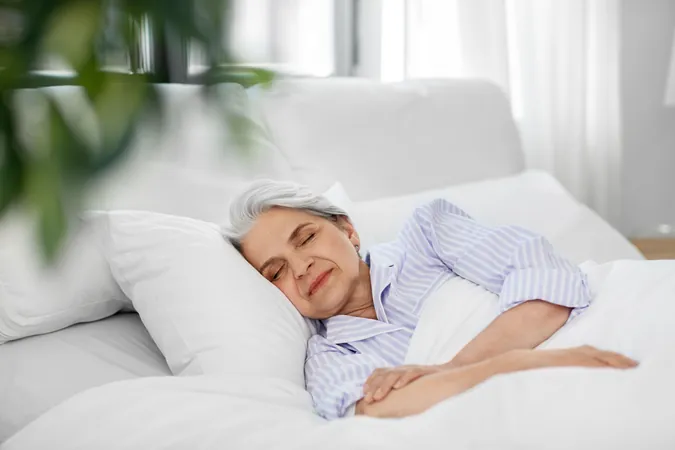
Boosting Sleep Quality to Combat Treatment-Resistant Depression in Seniors: A Game Changer for Mental Health!
2025-04-03
Author: Yu
Recent Research and Findings
Recent research reveals a promising connection between sleep quality and treatment outcomes for older adults battling treatment-resistant late-life depression (TRLLD). A post-hoc analysis of the OPTIMUM trial demonstrates that patients who improve their sleep habits are three times more likely to respond positively to various antidepressant strategies. This breakthrough finding by Dr. Michael Mak and his team from the University of Toronto highlights the critical role that sleep plays in managing depression, especially for seniors.
The OPTIMUM Trial
In the OPTIMUM trial, researchers explored different pharmacotherapeutic approaches to tackle TRLLD. They specifically aimed to understand how sleep quality impacted treatment efficacy, categorizing participants into groups based on their sleep patterns: those experiencing persistent insufficient sleep, those with worsening sleep, and those who achieved improved sleep.
Sleep Disturbances Among Participants
Surprisingly, at the trial's outset, 51% of participants reported struggling with sleep disturbances. Those in this group tended to be younger, had fewer years of education, and exhibited more severe depression compared to their well-rested counterparts. However, by the end of the 10-week treatment phase, this percentage fell to 36%, regardless of the type of antidepressant used.
Impact of Sleep on Depression
The evidence was compelling: participants who managed to maintain sufficient sleep or experienced improvement in their sleep were significantly more likely to see enhancements in their depressive symptoms. Notably, 25% of participants reported improved sleep, aligning with a response to their antidepressant treatment, while those with persistent insufficient sleep were found to be the least responsive.
Concerns with Sedative Use
The study also shed light on the concerning use of sedative medications among participants, with about one-third relying on these drugs for sleep or anxiety. The researchers caution that the potential risks of sedative hypnotics may outweigh their benefits, urging healthcare providers to educate patients on healthier sleep practices and explore alternative therapies.
Interventions for Insomnia
Dr. Benoit Mulsant, a co-author of the study, emphasizes the intricate relationship between depression and sleep disturbances. While many patients see their insomnia improve simply by treating their depression with effective medications, others may require more focused interventions. For those whose insomnia predates their depression and does not resolve with treatment, cognitive-behavioral therapy for insomnia (CBT-I) and sleep hygiene strategies become vital.
Holistic Approach to Treatment
The analysis also identified significant factors linked to sleep disturbances, such as loss of a spouse and lower educational levels. These findings underscore the need for a holistic approach in treating older adults with TRLLD by addressing their sleep health alongside their mental health needs.
Strategies for Physicians
For physicians treating these patients, strategies may include the addition of low doses of medications known for their sedating effects, like mirtazapine, or even low-dose doxepin to improve sleep maintenance, particularly in those patients who struggle with mild insomnia.
Importance of Diagnosing Sleep Disorders
However, a critical note is raised regarding the potential for undiagnosed sleep disorders, such as obstructive sleep apnea, especially in older adults with associated symptoms like fatigue and cognitive impairment. Referring patients for sleep studies can be crucial in these cases, as appropriate treatment may not only improve sleep but potentially enhance overall mood and quality of life.
Conclusion
In conclusion, the findings from the OPTIMUM trial are not just about antidepressant efficacy; they redefine how we approach treatment-resistant depression in geriatric populations. By prioritizing sleep quality and addressing sleep disorders, healthcare providers may unlock new pathways for healing in older adults battling these significant mental health challenges. The takeaway? Don’t overlook sleep—it could be the key to unlocking recovery!




 Brasil (PT)
Brasil (PT)
 Canada (EN)
Canada (EN)
 Chile (ES)
Chile (ES)
 Česko (CS)
Česko (CS)
 대한민국 (KO)
대한민국 (KO)
 España (ES)
España (ES)
 France (FR)
France (FR)
 Hong Kong (EN)
Hong Kong (EN)
 Italia (IT)
Italia (IT)
 日本 (JA)
日本 (JA)
 Magyarország (HU)
Magyarország (HU)
 Norge (NO)
Norge (NO)
 Polska (PL)
Polska (PL)
 Schweiz (DE)
Schweiz (DE)
 Singapore (EN)
Singapore (EN)
 Sverige (SV)
Sverige (SV)
 Suomi (FI)
Suomi (FI)
 Türkiye (TR)
Türkiye (TR)
 الإمارات العربية المتحدة (AR)
الإمارات العربية المتحدة (AR)